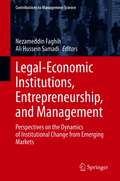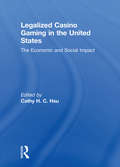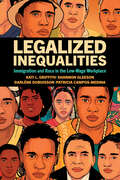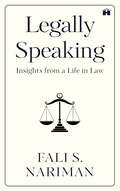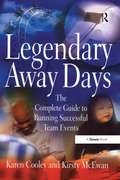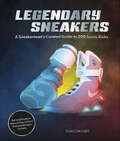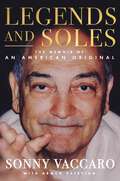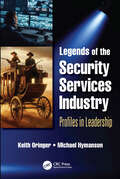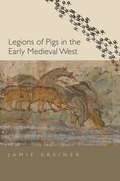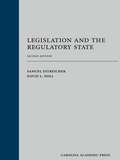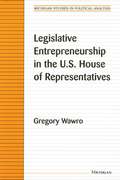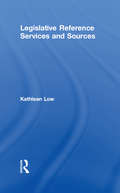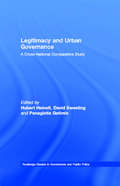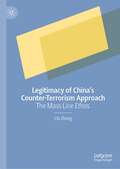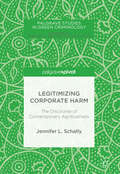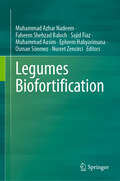- Table View
- List View
Legal-Economic Institutions, Entrepreneurship, and Management: Perspectives on the Dynamics of Institutional Change from Emerging Markets (Contributions to Management Science)
by Nezameddin Faghih Ali Hussein SamadiThe study of dynamics of institutional change in emerging markets are subjects of great interest in contemporary political economy. The dynamics and quality of institutional change can have significant impacts on the long-run performance of economies, economic growth and development of nations, and play a fundamental role in societies. It provides a comprehensive understanding of legal-economic institutions, and sheds light on the way to global peace by producing a better understanding of the dynamics of historical change. Topics range from institutional uncertainty, hybrid market order and labor market institutions, to good governance of institutions and WTO rules as trade institutions, as well as entrepreneurship and institutional change in emerging markets, and the role of modern technologies.This edited volume emphasizes legal-economic institutions, and the role of management and entrepreneurship on dynamics, trends, and implications of institutional change in emerging markets. Presenting research articles by eminent scholars and experts engaged in education and research, who address and discuss the most recent issues in the field, they reveal new insights into the dynamics of institutional change for researchers interested in development of new theories and comparative studies, especially in the era of emerging markets. The book is appealing to a wide range of global audience, can serve as a useful reference work in education and research, offers innovative and productive discussions, and can satisfy scholarly and intellectual interests, regarding institutional development and a broad spectrum of its interactions with functioning of markets and economies.
LegalTech (essentials)
by Clemens Engelhardt Benedikt QuarchDas essential vermittelt einen Überblick über den LegalTech-Markt, seine Akteure, Herausforderungen und Vorteile sowie Investionsmöglichkeiten. LegalTech ist derzeit in aller Munde und es haben sich auf dem europäischen Markt zahlreiche Unternehmen etabliert, die die Rechtsdurchsetzung digitalisieren und sowohl Verbraucher:innen als auch Anwält:innen helfen, effizienter zu arbeiten. Dabei ist LegalTech als wichtiger Teil des Fortschritts nicht mehr aus dem Rechtsmarkt wegzudenken.
Legalized Casino Gaming in the United States: The Economic and Social Impact
by Cathy Hc HsuCovering the entire United States gaming market, Legalized Casino Gaming in the United States provides gaming researchers, policymakers, and hospitality students comprehensive overview of the history, development, legislation, and economic and social impacts of riverboat, land-based, and Native American casino gaming. Containing national and regional research about the industry, this book will provide students with a historical view on gaming and the hospitality industry, offer researchers data and current market status of the industry; and will give policymakers information about the advantages and disadvantages of a gaming industry in their community.Comprehensive and thorough, Legalized Casino Gaming in the United States is full of case studies, data, and surveys that provide you with credible information on community incomes, residents’attitudes about gaming, and gaming taxes in certain states. This fact-filled book will help you evaluate and learn about the pros and cons of the industry, including: reviewing changes in the gaming laws and regulations in particular regions and segments of the industry explaining laws and regulations by state for riverboat and other Native American land-based gaming examining negative and positive social impacts of gaming, including crime; quality of life; community services; availability of entertainment, recreation, and cultural activities; community attractiveness, such as reputation, appearance, cleanliness, and traffic; local resident attitudes; and pathological gaming explaining Nevada’s gaming regulatory system, including the roles of the Nevada Gaming Commission and Gaming Control Board, and discussing issues related to currency transactions, exclusion lists, work permits, customer disputes, and underage gambling discussing positive economic aspects of Native American gaming, such as tax benefits, in Connecticut, Wisconsin, Oregon, and Minnesota, and how the industry impacts surrounding communitiesExamining the industry from ethical, economic, and social standpoints, the contributors offer you several perspectives of a situation, not just one side of an issue, to help you make educated decisions or opinions about gaming. Bolstered with charts, graphs, tables, and future research recommendations, Legalized Casino Gaming in the United States offers you an in-depth and comprehensive look at the gaming industry, helping you weigh the positive and negative effects of one of the most popular areas of hospitality.
Legalized Inequalities: Immigration and Race in the Low-wage Workplace
by Shannon Gleeson Kati L. Griffith Patricia Campos-Medina Dubuisson DarleneBeyond unlivable wages and a lack of upward mobility, low-wage work in the United States is rife with danger and degrading treatment. Immigrants and people of color are overrepresented in these “bad jobs” and often feel as though they are unable to change their working conditions. In Legalized Inequalities, law scholar Kati L. Griffith, sociologist Shannon Gleeson, anthropologist Darlène Dubuisson, and political scientist Patricia Campos-Medina investigate the government’s role in perpetuating poor and dangerous work environments for low-wage immigrant workers of color. Drawing on interviews with over three hundred low-wage Haitian and Central American workers and worker advocates, Griffith, Gleeson, Dubuisson, and Campos-Medina reveal how U.S. policies produce and sustain job instability and insecurity. Together, contemporary U.S. labor and employment law, immigration policy, and enduring racial inequality work in tandem to keep workers’ wages low, lock them into substandard working conditions, and minimize opportunities to push for change. Workplace regulations meant to protect workers are weak and underenforced, privileging employers over workers. At-will employment policies, which allow employers to terminate employees without cause, discourage workers from bargaining for better jobs or holding employers accountable for even the most egregious mistreatment. Federal immigration policy further disempowers workers by deputizing employers to act as immigration enforcement agents through immigration status verification requirements. Undocumented workers often believe they must endure maltreatment or risk deportation. Anti-immigrant sentiment—encouraged by U.S. policy—impacts workers across all status groups. Additionally, despite a proliferation of civil rights legislation, racial disparities remain in the workplace. Workers of color are often paid less, forced to complete more dangerous and demeaning tasks, and subjected to racial harassment. While these workers face formidable barriers to fighting for their rights, they are not entirely powerless. Some low-wage workers filed formal complaints with government agencies. Others, on their own or collectively, confronted their employers to demand fair and dignified treatment. Some even quit in protest of their poor working conditions. The authors argue that reforming labor and employment law, immigration law, and Civil Rights law is necessary to reshape the low-wage workplace. They suggest increasing funding for workers’ rights enforcement agencies, removing the mandate for employers to verify a worker’s immigration status, and making it easier to prove that employment discrimination has occurred, among other policy proposals, to help empower and protect low-wage immigrant workers of color. Legalized Inequalities not only highlights the crushing consequences of U.S. policy on low-wage immigrant workers of color but showcases their resilience in the face of these obstacles.
Legally Speaking: Insights from a Life in Law
by Fali S. NarimanIn this captivating volume, Fali S. Nariman invites readers into the fascinating world of law, life, and everything in between. With a masterful blend of wit, wisdom, and keen insight, he paints a vivid portrait of the legal craft, interwoven with pivotal moments and memorable milestones from the legal fraternity.The first part of the book presents a collection of vignettes and anecdotes on the judiciary, arbitration, and the practice of law, alongside Nariman&’s personal reflections that illuminate the spirit of the legal profession. It also offers glimpses of the towering figures he encountered throughout his distinguished career and the enduring lessons drawn from decades of legal experience.The second part brims with sharp and profound ruminations on a wide range of themes—from federalism, democracy, and human rights to freedom of the press, corruption, and corporate governance—highlighting the dynamic interplay between life and law. For anyone intrigued by the law&’s rich tapestry, this book offers both inspiration and timeless wisdom from one of India&’s most celebrated legal minds.
Legendary Away Days: The Complete Guide to Running Successful Team Events
by Karen Cooley Kirsty McEwanBuilding strong, responsive, teams is one of the key factors in putting your organisation ahead of its competitors. So why do many teams fail to deliver to their true potential? The answer is that even when the commitment and the will to succeed exist, hidden pitfalls lay in wait to foil the best intentions of managers and team leaders. This book will enable you to avoid tripping up and so produce teams able to take effective action before problems arise. Legendary Away Days is a complete and invaluable guide to planning and delivering team events suited to a wide range of circumstances including problem-solving, teambuilding, boosting morale and making decisions. Concise and practical, it covers choosing an appropriate event, organising and running the day, keeping control, using external experts and evaluating your event afterwards. Focused on best practice throughout, the book also provides help on ensuring your event is legally protected. If you want your teams to look back on their Away Days as legendary then this is the book you need.
Legendary Entertainment: Moneyball for Motion Pictures
by John Deighton Leora KornfeldLegendary, the Hollywood studio responsible for such hits as Jurassic World and The Dark Knight, decides to take the marketing of its films in-house, and to market them fan-by-fan. Owner Thomas Tull acquires the big-data-in-sports firm started by Matt Marolda and appoints him to run marketing analytics for Legendary. The methods perform well in the motion picture market. Other Hollywood studios want to lease its services, and firms outside of entertainment express interest. Marolda and Tull consider setting up Legendary Analytics as an independent consulting business. At that point Dalian Wanda, China's largest entertainment and real estate conglomerate, buys Legendary. Should Marolda focus on China or the diversified U.S. market?
Legendary Sneakers: A Sneakerhead's Curated Guide to 200 Iconic Kicks
by Tonton GibsStreetwear enthusiast and sneakerhead Tonton Gibs presents a curated collection of noteworthy sneakers, including • the best-selling pair and the most-expensive pairs, • shoes that embodied special themes (holidays, food, and more),• kicks that were featured on the big screen, and• the results of collabs with rappers.Plenty of information on sneaker history, key brands, and the evolution of the popular and comfortable shoes is also provided. With vibrant photos and fun design, this book will spark the imagination of any sneaker enthusiast.
Legends and Soles: The Memoir of an American Original
by Armen Keteyian Sonny VaccaroThe gripping and eye-opening memoir from the “Savior of Nike” and the man who discovered Michael Jordan, Sonny Vaccaro.Written in collaboration with six-time New York Times bestselling author Armen Keteyian, Legends and Soles provides context and truth to the sensational media stories and headlines, including:Vaccaro’s pivotal role in the never-before-told story of the courting and signing of Michael JordanHow Nike, at the behest of an embittered Knight, went as far as having the Portland FBI investigate Vaccaro who was working for archrival Adidas on a RICO charge of corporate espionageHis close relationships with NBA superstars Kobe Bryant, LeBron James, Kevin Garnett, and Tracy McGrady, and Hall of Fame coaches Jerry Tarkanian of UNLV and John Thompson of GeorgetownThe high stakes drama behind the O’Bannon lawsuit that changed the entire landscape in college sportsFilled with in-depth stories and sixteen pages of photos illuminating some of Sonny’s most treasured career memories, Legends and Soles is the long-awaited memoir of a giant of American sports and a marketing genius.
Legends of the Security Services Industry: Profiles in Leadership
by Keith Oringer Michael HymansonThe global contract security market now totals over $200 billion, with the number of private security officers exceeding that of public law enforcement officers. But this wasn’t always the case.Legends of the Security Services Industry: Profiles in Leadership presents the unique stories of 15 industry legends, who transformed the industry from early private detective and small night watch companies into large-scale contract security companies. The large-scale companies include, but are not limited to, Pinkerton, Burns International, The Wackenhut Corporation, Guardsmark, Wells Fargo, and U.S. Security Associates; as well as today’s leading security companies, Allied Universal, Securitas, G4S, Prosegur, and GardaWorld.The book begins in the nineteenth century, with early U.S. legendary detectives: Allan Pinkerton and William Burns. Then, the book focuses largely from the mid-twentieth century to the present, where successive generations of legends built large-scale contract security companies which competed with, and then acquired, those formed by the early legends. Part II legends George Wackenhut, Ira Lipman, and Tom Wathen; Part III legends, Charles Schneider, Kenneth W. Oringer, William Whitmore, Jr., and Albert Berger; and Part IV, Scandinavian legends Jørgen Philip-Sørensen, Lars Nørby Johansen, and Thomas Berglund, all developed major security companies. Part V includes current global security leaders Helena Revoredo Gut, Stephan Crétier, and Steve Jones. Part VI reviews the timelines and successful leadership of these legendary leaders, with a look at the future of the industry.The legends’ personal stories contain colorful insight into how they capitalized on the industry’s explosive growth. While each generation of legends faced unique social and competitive landscapes, their personal stories illustrate how they respectively succeeded. Their leadership and management prowess enabled them to achieve great success, as they displayed vision and achieved their goals through grit, determination, hard work, charisma, organizational skills, and calculated risk-taking.Each chapter has been extensively researched and includes firsthand accounts based on interviews with living legends, colleagues, and family of deceased legends. Personal, company and signature event photos add further color to the moving narrative. Their stories are not only highly interesting, but also provide a framework for current leaders, and the next generation of entrepreneurs, on how to build and lead large-scale security service companies. With a Foreword from Robert D. McCrie, PhD, longtime John Jay Professor and editor of the renowned industry publication The Security Letter.
Legions of Pigs in the Early Medieval West (Yale Agrarian Studies Series)
by Jamie KreinerAn exploration of life in the early medieval West, using pigs as a lens to investigate agriculture, ecology, economy, and philosophy In the early medieval West, from North Africa to the British Isles, pigs were a crucial part of agriculture and culture. In this fascinating book, Jamie Kreiner examines how this ubiquitous species was integrated into early medieval ecologies and transformed the way that people thought about the world around them. In this world, even the smallest things could have far†‘reaching consequences. Kreiner tracks the interlocking relationships between pigs and humans by drawing on textual and visual evidence, bioarchaeology and settlement archaeology, and mammal biology. She shows how early medieval communities bent their own lives in order to accommodate these tricky animals—and how in the process they reconfigured their agrarian regimes, their fiscal policies, and their very identities. In the end, even the pig’s own identity was transformed: at the close of the early Middle Ages, it had become a riveting metaphor for Christianity itself.
Legislating Instability: Adam Smith, Free Banking, and the Financial Crisis of 1722
by Tyler Beck GoodspeedFrom 1716 to 1845 Scottish banks were among the most dynamic and resilient in Europe, effectively absorbing economic shocks that rocked markets in London and on the continent. Tyler Beck Goodspeed explains the paradox that Scotland’s banking system achieved this success without the regulations Adam Smith considered necessary for economic stability.
Legislation and the Regulatory State
by Samuel Estreicher David L. NollEstreicher & Noll's Legislation and the Regulatory State provides an accessible, up-to-date introduction to the institutions and procedures of the modern regulatory state. Designed to emphasize regulatory policy and the practical aspects of administrative lawyering, the casebook explores Congress's reasons for regulating and the choices it makes when enacting legislation, the legislative process and tools of statutory interpretation, administrative agencies' position within the Constitution's system of separated powers, the Administrative Procedure Act, and judicial review of agency action.
Legislative Choices for U.S. Corporate Tax Reform
by Robert C. Pozen Eric LonsteinThis case asks students to wear the hat of a policymaker to explore the politically charged issues around corporate tax reform in the U.S.
Legislative Entrepreneurship in the U.S. House of Representatives
by Gregory WawroWhen members are elected to the House of Representatives they have a certain freedom to decide how they will act as members and how they will build their reputations. Just as in the market place entrepreneurs build businesses, so in the House of Representatives members have the freedom to choose to build legislative programs that will enhance their reputations in the institution. And yet entrepreneurship is also costly to members. Gregory Wawro explains why members of the House engage in legislative entrepreneurship by examining what motivates them to acquire policy knowledge, draft legislation, build coalitions, and push their legislation in the House. He considers what incentives members have to perform what many have perceived to be the difficult and unrewarding tasks of legislating. This book shows how becoming a legislative entrepreneur relates to members' goals of reelection, enacting good public policy, and obtaining influence in the House. The analysis differs from previous studies of this behavior, which for the most part have employed case study methods and have relied on anecdotal evidence to support their arguments. Wawro analyzes legislative entrepreneurship in a general and systematic fashion, developing hypotheses from rational-choice-based theories and testing these hypotheses using quantitative methods. Wawro argues that members engage in legislative entrepreneurship in order to get ahead within the House. He finds that the more legislative entrepreneurship that members engage in, the more likely it is that they will advance to prestigious positions. This book is of interest to students of Congress, legislative behavior and institutions, elections, and campaign finance. Gregory Wawro is Assistant Professor of Political Science, Columbia University.
Legislative Reference Services and Sources
by Peter Gellatly Kathleen LowHere is the first introductory guide to all aspects of providing legislative reference services. Unlike special libraries which deal with one specific discipline, legislative reference bureaus must deal with a full spectrum of subject areas and meet the unique needs of elected and appointed officials and their staffs. This guide helps librarians find the best current resources and services to answer the varied demands for information typical of legislative reference libraries. Legislative Reference Services and Sources facilitates the work of legislative librarians and makes them confident so that they can supply legislators and their staffs with the information needed to effectively examine, draft, or enact legislation of benefit to the public.No other book on the market provides such a comprehensive overview of legislative reference services. Author Kathleen Low acquaints librarians with over 100 sources useful in responding to information requests from legislators. A wide range of valuable topics are covered that will help legislative reference librarians meet the information demands of legislators and lawmakers including: an overview of essential reference services needed by legislators and their staffs specific protocols and forms of etiquette to observe when promoting services to elected and appointed officials over 100 frequently consulted titles in legislative references the usefulness of online resources how to recognize special services and sensitivity warranted by patrons and the services and responses to expect in returnLegislative Reference Services and Sources addresses the legislative reference services commonly provided, promotion of services, the librarian/client relationship, client expectations, the ethics of responding to certain requests, and the core resources used in legislative reference requests. It is an invaluable tool for beginning level legislative librarians, public services librarians, and state and federal agency librarians who need an introduction to this unique type of information service.
Legislatures and the Budget Process
by Joachim WehnerThe legislative 'power of the purse' is an important constitutional principle across contemporary democracies. Yet, national legislatures differ in their approach to fiscal control. What is the role of legislatures in the budget process? Why does this role vary across democratic countries? Are powerful assemblies a threat to the prudent management of public finances? This unprecedented survey of legislative budgeting tackles these questions using quantitative data and case studies. The analysis reveals a striking variation in the budgetary role of national legislatures across contemporary democracies, which is influenced by colonial heritage as well as current political dynamics. It also finds consistent evidence that powerful legislatures are associated with higher public spending than those with limited authority. Based on in-depth accounts of fundamental reforms to the budget process in Sweden and South Africa, Legislatures and the Budget Process explores how the tension between legislative authority and fiscal discipline might be reconciled.
Legitimacy and Urban Governance: A Cross-National Comparative Study (Routledge Studies in Governance and Public Policy #Vol. 9)
by Hubert Heinelt Panagiotis Getimis David SweetingA fresh examination of the relationship between two key issues in the on-going debate on urban governance - leadership and community involvement. It explores the nature of the interaction between community involvement and political leadership in modern local governance by drawing on empirical data gathered from case-studies concerning cities in England, Germany, Greece, Italy, the Netherlands, New Zealand, Norway, Poland, and Sweden. It presents both a country specific and cross-cutting analysis of the contributions that communities and leaders can make to more effective local governance. These country specific chapters are complemented by thematic, comparative chapters addressing alternative forms of community involvement, types and styles of leadership, multi-level governance, institutional restrictions and opportunities for leadership and involvement, institutional conditions underpinning leadership and involvement, and political culture in cities. This up-to-date survey of trends and developments in local governance moves the debate forward by analysing modern governance with reference to theories related to institutional theory, legitimation, and the way urban leadership and community involvement compliment one another. This book will be of great interest to students and scholars of politics and urban governance, and to all those concerned with questions of local governance and democracy.
Legitimacy of China’s Counter-Terrorism Approach: The Mass Line Ethos
by Chi ZhangThis book examines how the Chinese Communist Party (CCP) has sought to legitimise its counter-terrorism strategy in the eyes of its domestic and international audiences. An important element of CCP policy in Xinjiang has been the deployment of ordinary Chinese citizens, or the 'mass line,’ to create new realities on the ground. This book explores how the history of ideological struggle in the PRC has taken on new characteristics, as well as offering insight into how the CCP has maintained legitimacy in the eyes of its population, even as it pursues policies which are internationally controversial, shedding light on the past and future of the behaviour of the Chinese state, a subject of interest to China scholars, scholars of the Belt and Road, and counter-terrorism experts.
Legitimizing Corporate Harm
by Jennifer L. SchallyThis book utilizes critical discourse analysis to illuminate the ways in which one of the largest agribusinesses in operation, Tyson Foods, disguises their actions whilst simultaneously presenting the image of a benign, good corporate citizen. Schally unveils how the discourses employed by Tyson gain legitimacy by drawing on and aligning with larger cultural discourses that are often taken for granted and not adequately scrutinised. This original research, situated at the intersection of green and cultural criminologies, contributes to these current perspectives as well as to the burgeoning social harm approach within criminology. A bold and engaging study, this book will be indispensable for students and scholars of green criminology, corporate crime, animals and society, and environmental sociology, as well as environmental and animal rights activists.
Legrand's Acquisition of Milestone
by C. Fritz Foley F. Katelynn BolandIn June 2017, Legrand, a global specialist in electrical and digital building infrastructure which was a serial acquirer, announced it had signed an agreement to buy Milestone AV Technologies, a leading designer and manufacturer of branded audio-video products. This case describes Legrand's approach to screening, pursuing, and integrating targets as well as the criteria used to evaluate if a deal is successful.
Legumes Biofortification
by Osman Sönmez Ephrem Habyarimana Nusret Zencirci Sajid Fiaz Faheem Shehzad Baloch Muhammad Azhar Nadeem Muhammad AasimSustainable food production is vital to ensure food and nutritional security to growing human population. Recently, there has been a shift in agricultural production system, crop production is not only considering yield as primary interest to produce higher number of calories for reducing hunger, but also more nutrient-rich food to reduce malnutrition or “hidden hunger”. Micronutrient malnutrition is a continuing and serious public health problem in many countries, various Interventions to alleviate this problem have been implemented. Biofortification, the process of breeding nutrients into food crops, provides a comparatively cost effective, sustainable, and long-term means of delivering more micronutrients. Legumes have higher protein content than most plant foods approximately twice than cereals and are rich in the key micronutrients folate, niacin, thiamine, calcium, iron and zinc. This book summarizes the biofortification of legumes. Detailed information through contributed chapters shed light on legumes research relevant to human health, with key topics that include genomic and genetic resources for food security, conventional and modern breeding approaches for improving nutrition, agronomic traits and biotechnological interventions.
Lehigh Steel
by V. G. Narayanan Laura E. DonohueLehigh Steel is a specialty steel manufacturer that plummeted from record profits to record losses in less than three years, driven by an inability to distinguish between profitable and unprofitable business. The scale and growth of service activities and overhead costs in an increasingly customized product line suggests that activity-based costing (ABC) could unlock the secrets of profitability. However, the high fixed-cost structure suggests that theory of constraints (TOC) could also be relevant. Lehigh must determine how to measure profitability to rationalize its products.
Lehman Brothers (A): Rise of the Equity Research Department
by Boris Groysberg Ashish Nanda Lauren PrusinerUnder Jack Rivkin's leadership, Shearson Lehman's research department rose from relative obscurity to the highest ranking research department on Wall Street within three years. When Rivkin is promoted to head of equity, he wonders how to succeed in his new position.
